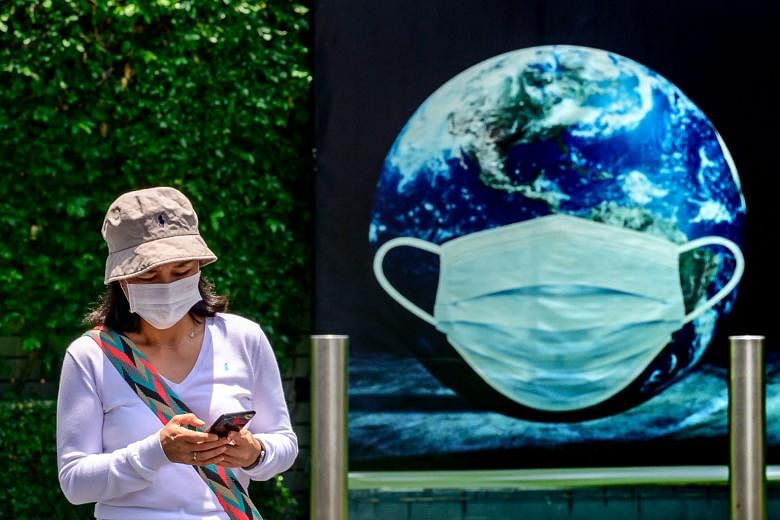India's devastating second Covid-19 wave has cast the spotlight on a new "double mutant" variant called B1617. The Straits Times gets answers to some questions surrounding mutations and variants that were raised in our monthly webinar a week ago.
The webinar, Season Two of Covid-19: Updates From Singapore, brought together local and international experts to discuss the latest medical and scientific findings regarding the coronavirus.
Q What is a mutation?
A A mutation is a change that occurs in the genetic material of the virus. Mutations arise when the genetic material is not copied precisely as the virus replicates during cell division.
Q What is a double mutant?
A It is true that the B1617 has two spike protein mutations, namely E484Q and L452R, but in reality, B1617 contains a total of 13 spike protein mutations. The name "double mutant" is just a name to refer to those two mutations and does not mean anything scientifically.
Q Is the B1617 variant new?
A It is not new, as the genome sequence of B1617 was first uploaded on to the Global Initiative on Sharing all Influenza Data, a platform which promotes the international sharing of all influenza virus sequences, in October last year. Prior to the massive surge in Covid-19 cases in India, this variant was also detected in the United States and Britain at the end of February.
Q If the B1617 variant is not new, what is the cause of India's current deadly wave?
A The B1617 variant cannot be ignored, but such outbreaks are multifactorial in nature and cannot be blamed just on the variant.
The surge in cases in India occurred at a time when more than 98 per cent of India's population had not received the full dose of the vaccine. This means many people are at risk of infection. Other possible contributory factors may include mass gatherings, relaxation of social distancing measures and limited testing capacity.
A surge in cases could also result in more variants, giving the virus greater chances of survival. If the genetic material of the virus is not copied precisely when it replicates, a mutation is the result. As more people get infected, the more the virus replicates and the higher the probability of mutations.

Q What are the mutations on the different variants and how have they helped the virus?
A Some of these mutations have been beneficial to the virus. For instance, the N501Y mutation present in Britain's B117, South Africa's B1351 and Brazil's P1 strain allows the virus to bind nine times more strongly to the ACE2 receptor. ACE2 is a protein on the surface of many cell types that helps the coronavirus get into cells. This will lead to more efficient transmission of the virus.
The L452R mutation, which is present in the variant initially identified in India, increases binding to the ACE2 receptor and also helps the virus to escape neutralising antibodies.
In theory, there will be only a certain number of mutations that will be beneficial to the virus. Hence, the repeated mutations independently developing across the different variants will be the ones that make the virus more efficacious and viable.
If true, then only one or two more vaccine versions may be needed to protect us against these variants.
Following recent guidelines from the United States' Centres for Disease Control and Prevention (CDC) that wearing of masks outdoors for fully vaccinated individuals can be relaxed, The Straits Times spoke to infectious diseases experts on whether mask-wearing habits will need to be changed in Singapore.
Associate Professor Hsu Li Yang from the National University of Singapore's Saw Swee Hock School of Public Health said that real-world data has shown that a small proportion of people who have received both shots of the Pfizer or Moderna vaccines can still be infected and potentially pass the virus to others.
Therefore, he believes that mask wearing should still continue to be encouraged.
Explaining the rationale behind relaxing these mask-wearing measures, US President Joe Biden said that the odds of transmitting the virus when one is both outdoors and fully vaccinated are "very, very low".
This is because fresh air can disperse and help to evaporate the respiratory droplets which may contain the Sars-CoV-2 virus.
For instance, vaccinated individuals in the US can exercise outdoors with their family members and attend small outdoor gatherings with both vaccinated and unvaccinated people.
Q With these variants arising, do I need to change my mask-wearing habits?
A No, as long as you ensure that you have a good triple-layered mask that properly covers your nose and mouth.
Infectious disease expert Leong Hoe Nam said that mask wearing is an effective physical barrier against virus transmission.
"The (virus) mutants don't change that," he said.
Dr Leong highlighted the importance of complying with mask-wearing measures, and ensuring that one has an effective mask rather than go for double-masking.
If one is already conscientious in mask wearing, there is no need to wear multiple masks concurrently, said Professor Teo Yik Ying, dean of the National University of Singapore's Saw Swee Hock School of Public Health.
"The current situation in Singapore, especially in the community, also remains one that is well under control, and that means as long as we keep up with the mask wearing, social distancing and the restrictions on large gatherings beyond eight people, there is no need to be overly concerned with wearing more than one mask," he said.


